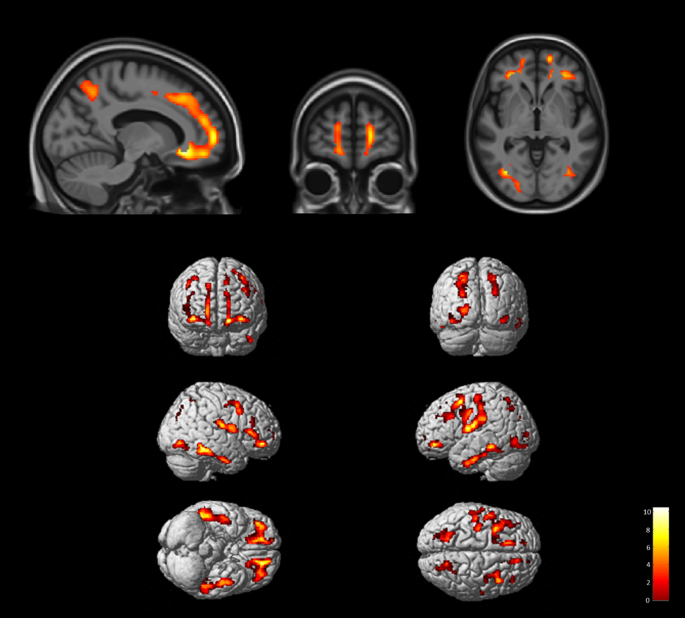
JESSICA ROSE - This SARS-spike thing they made ruins brains
A new study demonstrates hypometabolism (reduced glucose uptake) in specific areas of the human brain - think reason for brain fog
A new study has been published in Scientific Reports entitled: “Mapping brain changes in post-COVID-19 cognitive decline via FDG PET hypometabolism and EEG slowing”,¹
https://www.nature.com/articles/s41598-025-04815-6#Abs1
and it lays out a mechanism of action for brain fog/neurodegeneration/cognitive decline and other forms of brain deterioration seen in hundreds of millions of people from being subjected to SARS-2, and I might add, inevitably, from the COVID-19 shots encoding spike protein as well. The reason I say this is that there is no doubt in my mind at this point that the culprit of neuroinflammation and brain pathologies is the spike protein.
Our study aimed to investigate brain functional alterations and the underlying mechanisms using PET and EEG in post-COVID-19 subjects with subjective cognitive decline following mild SARS-CoV-2 infection, compared to healthy controls.
So they found brain functional alterations in people with what they refer to as “mild SARS-CoV-2 infection”.
Fluorodeoxyglucose positron emission tomography (FDG PET) measures brain glucose metabolism to assess function and disease, while electroencephalography (EEG) records electrical brain activity to evaluate neurological conditions. They used both techniques to paint a better picture of the connection between brain electrical activity and cerebral glucose metabolism in the context of brain functional dysfunction.
What they found in the 28 people with cognitive decline (defined as memory deficits, reduced attention, and executive function impairments, as well as fatigue) from SARS-CoV-2 (ahem: spike protein) in comparison with controls (28 people who’d had EEGs prior to the COVID-era with no recorded history of cognitive impairment or any other neurological disorders), was that the test group exhibited significant hypometabolism in particular locations in the brain. They found the largest hypometabolic cluster in the right frontal lobes of test subjects.
Fig.1 from article https://www.nature.com/articles/s41598-025-04815-6/figures/1
hypometabolic clusters (highlighted) found in text subjects
The right frontal lobe plays a key role in various human activities and behaviors, primarily those involving executive functions, emotional regulation, and social cognition. So if its damaged, it can lead to impulsivity, poor social judgment, emotional dysregulation, or reduced insight into one's behavior. Interesting.
The left frontal lobes, the temporal lobes and the parietal lobes were also found to exhibit hypometabolism. Wherever you find reduced glucose uptake, you’ll find impaired brain function.
Our study identified a shift in EEG rhythms from higher frequencies, such as alpha, to lower frequencies like theta and delta, particularly in anterior regions, which aligned with the observed hypometabolism clusters.
The shift from alpha to theta/delta EEG rhythms in anterior regions, characterized concurrently with hypometabolism in the frontal, temporal, parietal, and left occipital lobes, suggests neurodegenerative or pathological processes causing cognitive, behavioral, and perceptual deficits.
Sounds a lot like Alzheimer’s (dementia) to me.
The authors also point out this critical point in the Discussion.
Notably, the neurochemical basis of these findings may be linked to disrupted neurotransmitter systems, particularly involving GABAergic and glutamatergic pathways.
Yes. It could be. I believe the mechanism of action here is spike-induced neuroinflammation and vascular damage. On its own, hypometabolism reflects reduced neuronal glucose uptake due to dysfunction or inflammation. The spike protein's inflammatory and immunomodulatory effects are certainly contributing to hypometabolism in these brain regions by disrupting neuronal function and energy metabolism through microglial activation and cytokine release. Among other things.
Now. Think COVID-19 shots. What was the template they insisted on using to encode which protein now to be non-stop produced by people’s own cells? Hmm. Was it something like… spike protein? Or something?
I will leave you guys with a VAERS query of neuroinflammation-related reports. I included some of the symptoms reported in the study above including dizziness and headache.
In addition to cognitive decline, post-COVID-19 symptoms at the time of evaluation included asthenia (46.4%), persistent dyspnea (35.7%), hyposmia (28.6%), headache (25.0%), myalgia/arthralgia (17.9%), hypogeusia (17.9%), dizziness/gait instability (17.9%), palpitations/tachycardia (10.7%), and gastrointestinal distress (10.7%).
The chart below shows only VAERS ‘neuro’ reports (absolute counts by age group) that got to the front-end system. This is the tip of the iceberg - a representation of the 467,754 neuro reports in VAERS - based on those with age-data, and those reports that ‘got in’ and not subsequently removed. And this is ONLY in the COVID-19 shot context.
What do you think? Is spike ruining our brains? I think it is. It’s doing more than that though, don’t forget, but the brain is kind of important.
https://jessicar.substack.com/p/this-sars-spike-thing-they-made-ruins
I noticed that our membership is growing so people must be mentioning this group around. Welcome.
We have a few regular posters, but anyone can post, so if you come across something especially worth passing on, please do.
For those who may be new or who have been here for a while and never posted our group enjoys articles and other posts that provide a unique perspective and challenge the common narratives, fill in blanks, or simply entertain.
Readers 'like' some articles more than others, but 'liking' to me is more a sign that we found the article useful than that we agree with it. I often 'like' articles that i thought to be are quirky, off-base, or just plain wrong, but worth reading.
I came across this last week while listening to the Wright Report Podcast. Its about amazing developments in prosthetic limbs.
I have copied his report from the transcript:
Finally this morning, some incredible news for my veterans out there — but really anyone who’s undergone an amputation of a leg.
Researchers at MIT have developed a new surgery and prosthetic device for both below and above the knee amputations. The new device involves electronics that are infused into remaining muscles and bone tissue. It translates those electronic signals sent by the brain into wires
that operate the prosthesis. That allows the person to better control and direct their prosthetic device as they would their original limb.
As the researchers said, it’s integrated into the human body… it’s a melding of flesh and metal that act as one.
The study participants agreed.
They found they had greater stability, more control over the prosthetic device and that their damaged limb ... it felt like it used ...















